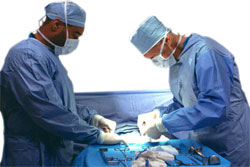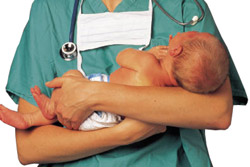For women planning a pregnancy or considering having children in the future, it’s always good to hear about the experiences of other women to get an idea of what you may be in for. While each birth may be as different as the little wonders that come from them, there are certain similar challenges you may need to face. So we talk to Tania about her first-time birthing experience and get the truth – straight from the horse’s mouth and bare as a newborn baby’s bottom.
Anyone for water sports?
Many times a woman’s water will break, kick-starting the birthing process. However, don’t expect this to be the definite clue that tips you off because it doesn’t always happen that way.
For Tania, she just started feeling cramping sensations.
“My waters didn’t actually break,” she says.
“One evening at about 6pm, I began to notice some cramping pains and that was the first sign of my labour. They started happening every couple of minutes so I realised that was the onset of labour.”
“My husband had just popped out to the shops, so I was by myself but I was really excited. When he walked back in he had no idea and I just said to him – ‘it’s started’. I was a bit nervous but I wasn’t in any pain. It was just a tightening sensation, like period cramps.”
“I rang my Mum and sister, then over the following 12 hours before I went into hospital my husband and sister stayed up with me.”
An average birth runs for about 12 or 13 hours from start to finish but Tania experienced a longer than normal pre-labour process.
“Mine was 24 hours but included about 12 hours of pre-labour. It was painful but manageable.”
“We went into hospital at about 6am. They had told me to come in when my contractions were about 30 seconds long and were regularly spaced apart.”
Drugs are not just for mugs
 But also for soon-to-be mothers! There are a few different options available for women hoping to avoid at least some of the pain of childbirth. Thankfully, we’re not giving birth in medieval times, so you may want to consider options like gas, pethidine or an epidural.
But also for soon-to-be mothers! There are a few different options available for women hoping to avoid at least some of the pain of childbirth. Thankfully, we’re not giving birth in medieval times, so you may want to consider options like gas, pethidine or an epidural.
Tania wanted to leave the option open as to whether she would take the epidural or give ‘natural birth’ a shot, where no drugs are taken at all and you can experience the birth just as nature intended.
Finally, Tania decided against an epidural but did receive some gas.
“I decided to see how I went with the pain because I was coping quite well with the contractions. Both my Mum and my sister had experienced very long initial stages of labour, I think it’s called pre-labour, before your cervix has dilated and your body is still preparing,” she says.
“I was glad I got to experience a natural labour, but it was quite an exhausting experience.”
Pain, pain, go away
“When I was pushing the baby out, I can’t lie, it was really the most incredible pain and certainly the most painful thing I’ve ever experienced,” Tania says.
“The good thing about it though, even when it was happening, was that I knew it wasn’t going to last very long and it would be over in 30 minutes or so.”
 “I hadn’t done breathing classes or anything and I don’t think you can really prepare for that kind of pain anyway.”
“I hadn’t done breathing classes or anything and I don’t think you can really prepare for that kind of pain anyway.”
“It was far worse than I thought it would be but I don’t want to scare anyone out of having a baby, so there are different tips you can be aware of.”
“For instance, there are different times you can request an epidural or a top-up.”
“Obstetricians actually prefer the epidural to have worn off a little bit, so that when the birthing process starts, you can feel when to push, because if you’re numb you don’t have those sensations. So it can be harder and take longer.”
“But if you really wish to not feel the pain, then you can ask them to give you more at that time so it takes the edge off.”
You can talk to your obstetrician about what kind of birth plan suits you best and discuss the mechanics of taking drugs during this process beforehand too.
‘Hole’ lotta love
Unfortunately, many women do experience some tearing of the vagina. After all, there’s a whole human coming right out of you! However, this is common and we have ways to stitch you up and get you back on the horse…figuratively (because you won’t be horse-riding for a little while).
“For the birth I did experience some tearing, although they can do an episiotomy, so the cut can be neater and easier to stitch,” Tania says.
 An episiotomy is a surgical incision through the perineum (that strip of skin where your bottom says hello to your vagina) and it’s made to enlarge the vagina and assist childbirth.
An episiotomy is a surgical incision through the perineum (that strip of skin where your bottom says hello to your vagina) and it’s made to enlarge the vagina and assist childbirth.
“I was a bit sore afterwards,” she said. “It can hurt a little, especially when you go to the toilet.
But I got some tips from my sister for that too. The nurses can give you some powder sachets that can neutralise your urine so it doesn’t sting as much.”
“Or another way, even though it sounds disgusting, is to just pee in the shower.”
After childbirth though, nothing will seem disgusting let alone peeing in the shower, so write that one down in case you need to remember how to pee without pain.
Rumplestiltskin: Babe in your arms
Up until not so long ago, the medical staff would take the baby first and perform tests and cleaning before you got a hold of the lil’ fella or lil’ lady.
“Nowadays, they just put the baby straight onto your chest if there’s been no complications,” Tania says.
“They let me hold her immediately and we captured the first moments of that on film. My daughter absolutely loved watching the images when she was older.”
 “After you’ve held your baby, they’ll quickly take them to do all the testing, cut the umbilical cord and just check they’ve got ten fingers and ten toes.”
“After you’ve held your baby, they’ll quickly take them to do all the testing, cut the umbilical cord and just check they’ve got ten fingers and ten toes.”
The rest, they say, is history – or herstory in Tania’s case, as she gave birth to a beautiful, healthy baby girl.
The bond that lasts a lifetime
Tania says she would do a couple of things differently and would next time have more tips and knowledge about the labour.
“For instance, I would probably not let the labour continue for so long without having an epidural because I was so exhausted following the birth,” she says.
“You’re going to be tired anyway, because you’re waking up to feed the baby, so it’s really important that you’ve rested as much as possible.”
“And they are quite important days, when you are bonding with your baby and adjusting to being a new parent.”
Now you know a few more ‘ins’ and some of the scarier ‘outs’ of childbirth, you can research and discuss with your doctor about the best way to approach your labour.
Sometimes, the best part of being prepared is also knowing someone else went through a similar thing, so don’t hesitate to discuss your fears of childbirth with a professional either or loved ones.
And when you hold your baby in your arms afterwards, all the pain will be worth it!



 (5 votes, average: 4.20 out of 5)
(5 votes, average: 4.20 out of 5) 






